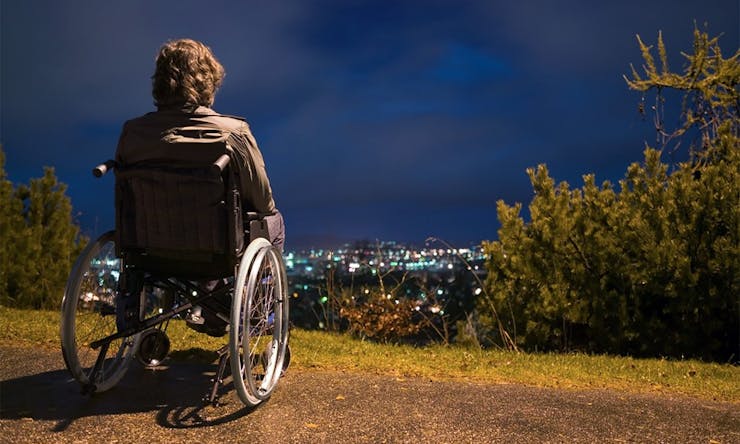Based on some exciting new anecdotal evidence, the use of cannabis oil to treat ALS may actually prolong the life of the patient in addition to relieving many of the disease’s devastating day-to-day symptoms.
Amyotrophic lateral sclerosis, also known as ALS or Lou Gehrig’s disease, named after the baseball legend, is a debilitating disorder that affects an estimated 30,000 people in the United States at any given time. You might remember ALS from that craze last summer when everyone decided to dump ice on their heads to raise awareness for the disease and to raise money for ALS research. Even Leafly hopped on the bandwagon for a good cause, and overall, the ALS Foundation received over $100 million in donations by the time the summer of the Ice Bucket Challenge was over.
ALS is a degenerative neurological disorder that causes muscle weakness, wasting, and paralysis of the limbs, as well as those that control vital functions such as speech, swallowing, and breathing. It is often the deterioration of these crucial muscles that leads to respiratory failure; even with breathing aids or a tracheotomy, the risk of respiratory failure persists.
Being diagnosed with ALS is devastating, and for many it can feel like a death sentence. The average life expectancy of a person with ALS is two to five years. However, more than half of all people with ALS live more than three years from diagnosis and there are definitely outliers, such as Stephen Hawking, one of the most iconic figures with ALS. Hawking was diagnosed in 1963, and now, more than 30 years later, he is among only 5% of those diagnosed with ALS who live more than 20 years after diagnosis.
Cannabis has long been known as a viable treatment option to relieve symptoms of ALS, which was outlined in this handy chart created by the American Journal of Hospice and Palliative Medicine, but the most astonishing results have come from several ALS sufferers who have managed to slow the progression of the disease through regular, controlled doses of cannabis oil.

Bob Strider began experiencing the symptoms of ALS in 1998, specifically the loss of function in his right arm and problems swallowing. An avid cannabis enthusiast, he had used cannabis heavily for decades, which he believes has kept the progression of his disease slow but steady. In 2012, Strider began manufacturing his own cannabis oils, dosing himself with approximately a gram a day for 60 days. Within 10 days of his regimen, he regained control of his right arm and was able to stop using opiates to manage his pain.
Another remarkable case comes from Cathy Jordan, who was diagnosed with ALS in 1986 and given less than five years to live. In the winter of 1989, Jordan spent the holiday in Florida, preparing for the end of her life, when she made a crucial discovery. While walking on the beach one night, she smoked a joint of Myakka Gold and felt her symptoms cease, essentially experiencing the neuroprotective effects of cannabis before they’d been proven.
Jordan never set out to be a cannabis activist, preferring instead to quietly continue treating her disease. She tried to tell her neurologist in 1989 that cannabis had helped her, and he tried to convince her husband to have her committed to a mental facility. In 1994, Jordan met a new doctor who was astonished by her progress. When he asked what she’d been doing to stay alive, she informed him, and he advised her, “Smoke all the cannabis you can and never tell a soul, because they will never believe you.”
Unfortunately, Donnie Clark, the grower of Myakka Gold (named for the Myakka region of Florida), was arrested and sent to prison for 12 years until his sentence was commuted by former President Clinton. The strain itself, which Jordan credits with stopping the progression of her ALS, has since been eradicated by the DEA.
Cathy Jordan, however, ended up becoming the inspiration for Amendment 2, the medical marijuana initiative in Florida that was edged out last November. Ironically, on February 25, 2013, the same day that the Cathy Jordan Medical Cannabis Amendment was announced, Jordan’s home was raided and 23 plants were seized by local authorities, although charges were dropped when it became evident that she was using cannabis for medicinal purposes.
Now, finally, years later, there has been more and more conclusive research indicating that these patients’ self-medicating regimen was beneficial, after all. Preclinical data shows that cannabis has powerful anti-oxidative, anti-inflammatory, and neuroprotective effects, and with regular applications, it may actually slow the progress of the disease and prolong the lives of the individuals affected by ALS.
Amyotrophic Lateral Sclerosis is a qualifying condition for medical marijuana programs in Delaware, Washington, D.C., Georgia, Illinois, Maine, Massachusetts, Michigan, New Jersey, New Mexico, and New York. However, with more promising research emerging, other states’ medical marijuana programs need to follow suit and allow suffering patients the right to try and treat this horrible disease with cannabis if it can provide them with even a little bit of relief.





